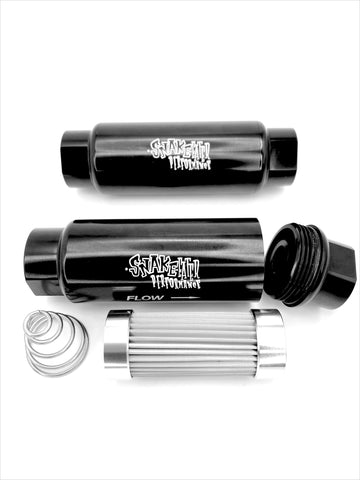Fuel Filters: How to determine which fuel filter is right for you

Filtration is an essential consideration when upgrading your fuel system from carbureted to EFI.
Many older OEM filters are not rated for the pressure of EFI systems. Most OEM replacement filters are not rated for the pressure of a boosted application fuel system. Make sure to choose an aftermarket filter that is rated appropriately for your needs.
Fuel filters are rated for filtration by the average pore size of the filter element. 100 microns is great for pre-pump, but some newer pumps will require finer, such as 80 micron.
Choosing a filter that has the proper element is crucial. Not all filter element materials can withstand higher fuel pressures, ethanol or race gasses.
The best filter elements are stainless steel and microglass. Cellulose is the most common, however. A cellulose filter is not recommended for use with ethanol fuels because both contain organic compounds. This can create a bio sludge that wreaks havoc on downstream fuel system components.
Multi-Port Fuel Injection (MPFI) fuel injectors require 10-micron filters positioned after the pump, while Gasoline Direct injection (GDI) injectors require 5-micron filters.
There are no fuel injector manufacturers that recommend any fuel filter over 10 microns.
Many OEM MPFI applications will not have a fuel filter after the pump. These applications generally do not have a filter finer than 100 microns. OEM applications generally use majority hard lines and do not have fuel pumps with extremely high flow, so they don’t need the 10-micron filter and rely on a tiny filter basket atop the fuel injector for injector protection. This is insufficient for high flow fuel systems.
High performance OEM vehicles will have a fuel system with a 5-10 micron filter post pump and pre-fuel rail. One example is the Chevy Corvette C6 and up.
When adding a much higher flow pump and injectors, it is crucial to upgrade the fuel filter accordingly. The higher volume of flow as well as the increased suction of the pumps means a higher likelihood that contaminants in your tank or lines can make their way into your fuel injectors and cause a failure.
A failed fuel injector can cause catastrophic engine damage!
MPFI fuel injectors require 10 micron fuel filters with an appropriate element for the fuel you intend to use.
GDI fuel injectors spray directly into the combustion chamber and have finer internal tolerances. This requires finer filtration. 5 micron is standard.

Parts Dealer Links
In-Tank Fuel Pumps
https://www.snakeeaterperformance.com/collections/fuel-pumps
Retrofit Fuel Tank Units
https://www.holley.com/search/?q=retro%20fit%20fuel%20tank
Filters and Filter Fittings
https://www.snakeeaterperformance.com/collections/fuelpump-fittings-and-filters
Fuel Injectors
https://www.snakeeaterperformance.com/collections/all
Need Help?
We're here to answer all your questions!
E-mail us at: Support@SnakeEaterPerformance.com
Give us a call at (808) 262-5928
Want more help designing your ENTIRE fuel system? Download our free e-Book that was written to help you do just that. This free 50+ page e-Book contains everything you need to know when designing your fuel system, including where to buy the best parts!
This is a 50+ page e-book that was written to help beginner and intermediate DIY mechanics tackle one of the most complex and overwhelming subjects when building a race car or doing an EFI engine swap!


